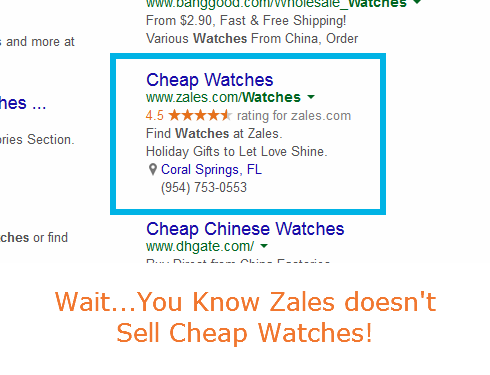Too many times I take over a PPC account that is massively wasting money in every direction. This happens in both ecommerce and service based businesses. It is a product of an inexperienced user setting up the account, and usually stems from companies setting up their own accounts or even PPC “Experts” without much experience. The following seven techniques should be used to audit your accounts to make sure they’re as tight as can be.
1. “Cheap” & Misleading Keywords
If you offer a high end diamond watches it is not wise to use keywords in your campaign such as cheap diamond watches for sale as you may show up for people looking for a cheap gift for their tween. This one should be very obvious but we’ve seen it many times in our years of PPC management experience when we take over new accounts.
The best part is that usually it’s not the business owner or even in-house employees adding such misleading keywords as they know their company doesn’t market to the cheapskates of the world. More often than not it stems from marketing agencies that don’t understand at all who the client’s demographics are or even what the company stands for.
Visitors and/ or leads may roll in but they will not likely be valuable customers. It’s easy to tell if you have “cheap” and otherwise misleading keywords by browsing the keywords tab in your AdWords or Bing Ads account. If you see any that don’t match up with your business model simply check their corresponding check boxes and delete.

Similar to the concept of misleading keywords is the bad practice of misleading ad copy. Don’t use words such as “Blowout Sale” or “Store Closing” etc. if they aren’t true. If you use any such promotional link bait copy you’d better at least have a visible strike through of the regular price and a sales price displayed. Another acceptable strategy would be to have a banner advertising a coupon code once they land on your page.
Also just like your appropriate keywords you’re using try to represent your products or services correctly so there aren’t any surprises when landing on your site. Keep an eye on your bounce rate from your paid search traffic sources to help evaluate the health of the marriage of your keywords + ad copy + landing pages.
3. Loose Match Types
You may want to consider not running broad match keywords at all. Consider the following example: You sell luxury house boats and you provide credit to those looking to buy. Your lender can’t work “miracles” and can only extend financing to those that are well-qualified. If you bid on a broad match keyword such as: houseboats for sale, you will likely show for bad credit house boats for sale, lake homes for sale, house boats for people with foreclosures, and a whole slew of other search results. My recommendation would be to not start with broad match keywords unless you bid very conservatively with them or heavily modify them with plus signs.
I recommend creating many long tail keywords and starting off with mostly exact match keywords in the beginning especially if you have a limited budget.
4. No Negatives
Whether you are bidding on broad match keywords or not, not utilizing negative keywords to their full potential costs you money…all the time! Let’s consider a similar circumstance to that above.
Let’s say you are a broker and provide home mortgages. You have a phrase match keyword “home mortgage rates” without negative keywords such as: bankruptcy, bad credit, poor credit, no credit, etc. you will show your ad for those searches and get unqualified leads from those wasted clicks. You will then waste your time following up with someone that you won’t be able to provide a loan to.
Example keywords that you would show ads for might be: bad credit home mortgage rates, home mortgage rates with bankruptcy, etc. If this is part of your target market then great but it’s probably not. You can set up Negative Keywords via the Shared Library in both Google AdWords & Bing Ads and apply to any campaign you wish. Oftentimes you can apply the keywords you created to all campaigns. You will probably notice a pattern in negative keywords if you service clients and can start applying “template” lists of negative keywords based on your clients’ industries.
5. Not Setting up Ad Scheduling
Sales leads after hours when no one is around aren’t as great, neither are form submissions as you’ll be less likely to get in touch with them the next day or after a weekend. If you’re not already using ad scheduling you should consider it to give yourself more hot leads. Ad scheduling is flexible in both Google AdWords and Bing Ads. It can be applied to any type of campaign and is easy to set up. Simply pick the days and times you want your ads to appear and done!
Click Pictures to Enlarge
Once you click on “Ad Schedule” you’ll be able to set the days and times you want your ads to show. You can also do mobile bid adjustments based on the time of the day as well to either increase or decrease. I like to keep my “normal” bids what I want them regularly and then decrease bids at certain times of the day that yields a higher cost per conversion. You will be able to make your own conclusions about the quality of leads or sales in the middle of the night to see if it’s even worth your money to bid at all during these hours. We’ve found that certain industries need to show ads all hours where some are a complete waste of money during certain hours and on certain days.
6. Misleading Ad Copy
Don’t advertise something as the real thing if it’s not. A perfect example would be an esthetician advertising laser hair removal when they’re really offering IPL sessions. If you’re unsure what that is I’ll enlighten you. Basically it’s an apparatus with a highly concentrated light source that you “zap” yourself with in hopes that it will reduce your unwanted wilderness. Truth be told it only works on people with really dark hair, can’t be used in sensitive areas of the body, and it hurts like a mug. Long story short, it doesn’t work for most people and is certainly not as fast or permanent as laser hair removal. Most astute patients of various salons will be a complete waste of time if they’re thinking they’re getting the real thing and if people even sign up for one session they likely won’t be long-term customers. You should also be wary of using {KeyWord: Insertion} in headlines and other parts of your ad if you don’t have extensive negatives as what’s likely happening in this Zales ad when I searched cheap watches.
The moral of this paragraph…Don’t advertise one thing and then provide another.
7. Not Spying on Your Competitors
Looking at what your biggest and most profitable competitors are doing is a great way to gain more qualified leads. Let’s get started with the low hanging fruit. You should consider checking out their ad copy, landing pages, calls to action, web design, etc. Many large companies regularly conduct A/B testing to improve conversion rates. If you haven’t been able to do any yet consider creating an experience similar to a competitor and then start doing A/B testing on your own to gain an edge and thoroughly optimize your keyword + ad copy + landing page combos.
There are various tools to retrieve additional information from sources that scour the web collecting data. We recommend Spyfu, SEMRush, iSpionage, etc. Insightful nuggets of information available is an idea of what keywords they’re bidding on, how much they’re spending, etc. Please keep in mind that these are meant to give an idea only, they are estimates only and can be grossly inaccurate.
Click Pictures to Enlarge
Go to SpyFu and enter a url to see some PPC insights. Click on the PPC Keywords tab to see even more details. If you like what you see and want more simply sign up to get full access. As mentioned before, please keep in mind that these are estimations and should not be taken as exact figures to take to a potential client to try to wow them with your knowledge of their PPC Campaigns that they haven’t given you access to. We did that once and the client was actually spending about 5x more and we looked ignorant.
The insights that can be gained are a range of what they might be spending as well as keywords that they have been bidding on, approximate cost per click, etc. It is great for getting additional keyword ideas for terms that you may not have previously thought of.
Put the Plan into Action!
Be an ROI-ist. Spend some time to make sure you’re using these techniques to their max. Your bottom line will thank you.






